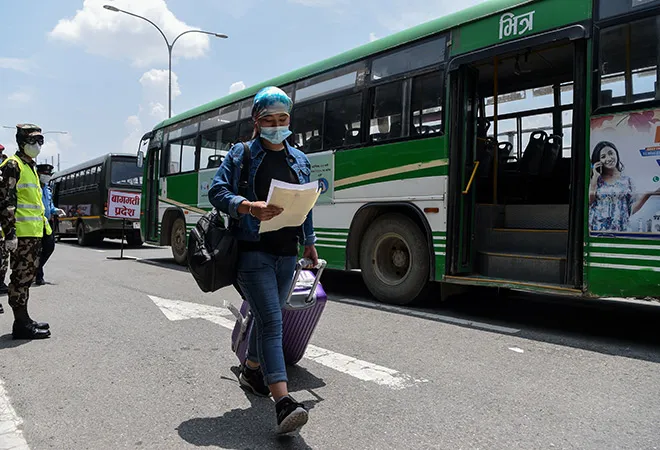
Never in the past had the unemployment problem been as severe in Nepal as it happens to be after the outbreak of COVID-19, which infected 250,916 people and caused the death of 1,743 people as of 17 December. In the absence of jobs at home, quite a sizeable chunk of the total population has been leaving the country for foreign destinations, including India, the Middle East, Malaysia, South Korea and Japan. This has created a huge shortage of labour in the agricultural, industrial, construction, tourism, business and trade sectors affecting the growth of the country.
However, the exact figure of people migrating to a foreign land for jobs, especially through the informal channels, is not known. Of Nepal’s total population of nearly 30 million, 3.5 to 8 million of the Nepalese, particularly from the hills are working in India while about 6 million of the Nepalese migrant workers are engaged in jobs in countries other than India.
In the absence of jobs at home, quite a sizeable chunk of the total population has been leaving the country for foreign destinations, including India, the Middle East, Malaysia, South Korea and Japan.
On account of the COVID-19 pandemic, 81 percent of the workers in the informal sector and 1.4 million in home-based work are at severe risk of losing jobs. As per the estimate made by the International Labour Organisation (ILO), 1.6 to 2 million jobs have been disrupted in Nepal in such sectors as wholesale and retail trade, manufacturing, construction, transport, accommodation, food services, real estate and administration.
There are also reports that quite a large number of the youth are leaving the country for foreign countries on visit visas with the intention of ending up there as undocumented workers. To check this trend of moving outside the country illegally, the Department of Immigration of Nepal has proposed English language communication proficiency as one of the basic criteria to qualify for going abroad on visit visas. But it is feared that such a move is illogical. It is not fair to check those workers bound for foreign destinations on so flimsy a ground as not being proficient in the English language. Hence, a fresh proposal has been made where buying insurance worth NPR 2 million, rather than English language knowledge, should be the criteria for a person to go abroad on a visit visa.
During the COVID-19 pandemic, there was a great expectation that the government would come out with some concrete policies and programmes to create jobs for those workers who were laid off.
A recent survey conducted by Nepal Rastra Bank, the central bank of the country, found that after four months of the nationwide lockdown, the pandemic led to the closure of 61 percent of businesses. This made hundreds of thousands of workers jobless, apart from severely affecting the production and supply chain. During the pandemic, 22.5 percent of the employees in the business sector were laid off. Nearly 40 percent of the staff were laid off in the hotel and restaurant sector and 30.5 percent of the employees were laid-off in the small and medium scale enterprises. The salaries of the employees were also deducted in some of these industries. Many business firms failed to pay rental fees and interests on the loans of the banks.
During the COVID-19 pandemic, there was a great expectation that the government would come out with some concrete policies and programmes to create jobs for those workers who were laid off. Towards this end, the government not only announced a repatriation programme for the migrant workers, but it also introduced a stimulus package for reviving the units that were hit by the pandemic.
Estimates are that more than half a million workers returned to the country from India during lockdown.
The government announced that it would create nearly 700,000 jobs in the current year under the Prime Minister Employment Programme, vocational skills training and other schemes. It also allocated a hefty amount of money for job creation in the agricultural and construction sector for the needy youth and also for those migrant workers who returned to the country after they were laid off. Estimates are that more than half a million workers returned to the country from India during lockdown. Additionally, about 151,000 people returned to the country after they lost their jobs in other foreign countries. But in actual practice, the government contributed very little to create jobs in the country as it was largely plagued by an internal power tussle in the ruling political party and also in border-related issues with India and China.
So, out of frustration, most of the migrant workers returned back to India from different crossing points along the Nepal-India border after the festival season like the Dasain and Tihar. Those people had no option but to leave the country for India because of the lack of prospects for employment opportunities within the country.
Unfortunately, the job creation for the youth has not been a priority for the present government in Nepal or, so to say, for any of the governments in the past. The planners and policymakers in the country are indifferent to this problem as they are satisfied merely with the growth of remittance from migrant workers, which accounts for more than over one-fourth of Nepal’s Gross Domestic Product (GDP) of US$ 30 billion. This has also worked as a safety valve for those in power who failed to create jobs for the youths.
If this problem is not addressed in the near future, it could pose a severe challenge to peace and stability in the country.
Even though the unemployment problem continues to be aggravated during the COVID-19 pandemic period, it is a pity that no significant effort was made by the government or even the private sector to generate employment opportunities on a mass scale for the youth. If this problem is not addressed in the near future, it could pose a severe challenge to peace and stability in the country.
Before it is too late, it is necessary on the part of the federal, provincial and local governments to provide easy loans and grants to entrepreneurs, unemployed youth, differently-abled persons and the recent returned migrant workers to start businesses. Prospects of employment are high in the livestock, agricultural, industrial, tourism, business and trade sectors, apart from micro, small, medium and larger development projects in the country. Sharing Indian and Chinese experience on this front could also be important. Such a move might help revive the ailing Nepalese economy whose rate of economic growth is as low as near zero per cent. But for all this, strong political will is necessary.
The views expressed above belong to the author(s). ORF research and analyses now available on Telegram! Click here to access our curated content — blogs, longforms and interviews.




 PREV
PREV


